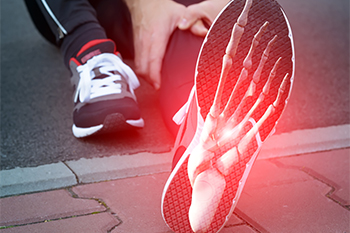
Running is a cherished pastime across the country and an excellent way to stay in shape. However, if you are running with ill-fitting running shoes, you could be putting the health of your feet in jeopardy. Running with shoes that do not match the shape of your foot can lead to afflictions including bunions and naked toes. To avoid these unpleasant conditions, you should be mindful of what you might look for in a potential pair of running shoes. Of course, selecting the ideal pair of shoes is a highly individual process that will be specific to each runner. Yet, there are rules that runners might follow to guide them along this process. First and foremost, runners should prioritize finding shoes that fit the shape of their feet instead of shoes that look most fashionable or visually appealing. Additionally, a good pair of running shoes will have an insole that mirrors the natural shape of the runner's arch. Ideally, the ankle collar of the running shoe will fit comfortably and securely, but not tightly enough to cause rubbing and chafing. Good running shoes will also have toe boxes that give each toe enough space to comfortably rest in the shoe. When it comes to running, selecting the right running shoe is no joke, but these guidelines and a podiatrist might help you in your search.
If you are a runner, wearing the right running shoe is essential. For more information, contact one of our podiatrists from Foot & Ankle Associates of Maine. Our doctors can provide the care you need to keep you pain-free and on your feet.
Choosing the Right Running Shoe for Your Foot Type
To increase performance and avoid the risk of injury, it is important to choose the right running shoe based on your foot type. The general design of running shoes revolves around pronation, which is how the ankle rolls from outside to inside when the foot strikes the ground.
- Neutral runners are able to choose from a wide variety of shoes, including minimalist shoes or even going barefoot.
- Runners who overpronate, or experience an over-abundance of ankle rolling, should choose shoes that provide extra motion control and stability.
- Runners who underpronate, or supinate, have feet that have high arches and lack flexibility, preventing shock absorption. They require shoes with more flexibility and cushion.
If you have any questions please feel free to contact our office located in Brunswick, ME . We offer the newest diagnostic and treatment technologies for all your foot and ankle needs.
